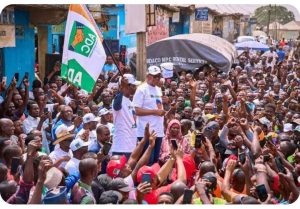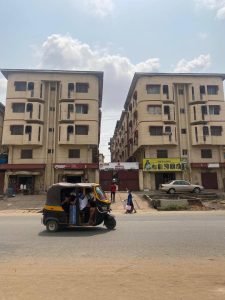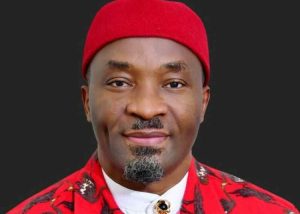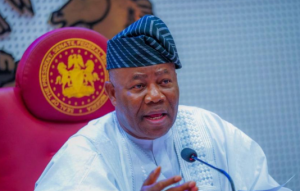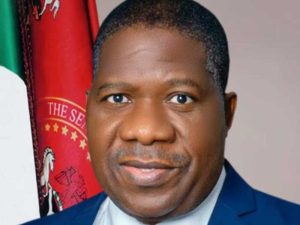The amalgamation of 1914 is not the reason for the presenl state of affairs in Nigeria

The amalgamation of 1914 is not the reason for the presenl state of affairs in Nigeria
These two words, nation and country are often used interchangeably, according to the dictionary, they are not really synonyms semantically speaking. Google has this to say about the two, “A nation is a large group of people with similar characteristics and culture. A country is a geographic region that has boundaries and borders. The important thing to remember is that a country has its own national government while a nation has its own national character”.
Nigeria as it is today was an economically expedient creation of the British colonial government with Lord Frederick Lugard the then governor of both the Northern Nigeria Protectorate and the colony and Protectorate of Southern Nigeria. This called amalgamation but as it is today, the amalgamation of 1914 is not the reason for the presenl state of affairs in Nigeria
Socially, the word Nigeria has been explained as, ‘Niger Area’ having been suggested by the then partner of Lugard, Flora. There are two prominent rivers in Nigeria, rivers Niger and Benue with a confluence in Lokoja in the present day Kogi state. The amalgamation took place on January 1, 1914.
The amalgamation is now a century old and the independence of Nigeria 64 years old. Looking back at the amalgamation, nothing prompted the action besides political economy. The Southern Protectorate then had a very buoyant economy and the colonial administration sought to balance out the Northern deficit with the Southern surplus. In economic terms, the situation has not really changed. The poverty index still tilts heavily against the North.
Take for an example, out of school children in Nigeria seems to be the global highest with more than 60% of the number that stands at about 40million in the northern region of the country. Malnutrition, maternal and child mortality, illiteracy and other major indices of underdevelopment weigh heavily against the North. Presently, the economy of the region is not faring better either as social crimes like insurgency, banditry, kidnapping and herdsmen attacks on farmers have not only impacted socio-economic lives of the region but invariably the whole country, but mostly originated from the North.
Since the amalgamation, there have been debates both formal and informal about the viability and value of the amalgamation. Given the google definition of the words, nation and country, Nigeria seems straddled on the fence of both terms. Even more than six decades after independence, the constituent units of Nigeria seems to be the proverbial oil and water – difficult to mix.
The Roundtable Conversation believes that the political elites before and after independence have contributed in the alienation that has happened between the people of the two regions. In 1952, Sir Abubakar Tafawa Balewa had said ““…the Southern people who are swarming into this region daily in large numbers are really intruders. We dont want them and they are not welcome here in the North. Since the amalgamation in 1914, the British Government has been trying to make Nigeria into one country, but the Nigerian people are different in every way including religion, custom, language and aspiration. The fact that were all Africans might have misguided the British Government. We here in the North, take it that Nigerian unity is not for us.” (As cited by A. Adeleye, “Amalgamation of 1914, Was it a mistake”? Vanguard, Lagos, May 18, 2012).
He went on to become the post-independence Prime Minister from 1960 – 1966. Even though he voiced his opinion, politicians from other regions possibly shared his views about their own regions especially after the first and subsequent coup d’etats that seems to have poisoned the political space. Even the first coup was seen as a regional agenda and the pogrom that preceded the civil war cannot be said to be unconnected with spoken and unspoken regional alliances.
The post-civil war political rhetoric and the inability of the then head of state, Gen. Yakubu Gowon (Rtd.) to keep to his promise of the three Rs; Reconciliation, Reconstruction and Rehabilitation did little to reunite the amalgamated people. This in a way set the pace for further divisions as the regions started being split into states trying in a way to isolate the Igbo speaking areas. The creation of the twelve states led to the creation of 19 states then to 36 states all by military governments. The reasons were as political as they were divisively incoherent as most of the states are insolvent and not viable. While there has been political capital from the splitting of the amalgamated regions into 36 states, the economic value has been a total disaster a Nigeria is seemingly the poverty capital of the world with governments not serving the people.
Have there been benefits from the amalgamation 100 years after? This is debatable. To many scholars, in reality, the regions seem to have been disempowered economically as the regional economic viability seems to have waned. The centralization of power has economically weakened the constituent regions as attention seems to be on oil that came following the discovery of oil in commercial quantity in Oloibiri in Bayelsa state. Nigeria made so much money from oil that the then head of state, Yakubu Gowon had in what many saw as a juvenile exuberant rant boasted then that money was not Nigeria’s problem but what to do with it.
The regions became very indolent and deviated from their areas of economic advantage and focused on oil money. Mismanagement of government structures by successive governments, whether military or civilian has led to the impoverishment of the entity called Nigeria.
Then one can understand that, the amalgamation of 1914 is not the reason for the present state of affairs in Nigeria.
The political class seemingly corrupted, and the military has done nothing to upgrade the country economically. Nepotism based on regional patronage and weaponization of ethnicity and religion have been the bane of Nigeria as a country.
Nations are not divine gifts, they are made by humans who value the human family in ways that encourage them to bring people together and optimally manage the values of differences. It needs leaders with vision and a defined mission to coalesce a people with differences in language, culture, religion and history to work in unity and with a view of building a nation rooted in mutual respect, economic growth and political equity.
The myopic nature of successive governments in Nigeria since 1960 has continued to inspire divisive tendencies amongst the general population. Leadership has really been lacking and most leaders have lacked the will and charisma to see beyond ethnic and religious affiliations. Nigeria has lacked a sense of unity in real terms because even though there is a working constitution, in practical terms, the leaderships often have worked in breach of the constitution.
The upholding of law and order is a sine qua non to the building of a cohesive nation. The abuse of power and the monopolization of political structures by certain groups in the Nigerian states continue to push the country towards the edge. Progressively, the political class at local ,state and federal levels keep finding areas of differences to project as far as they can get political advantages to exclude others.
While the Roundtable Conversation believes the British was not fair in arbitrarily amalgamating the country in 1914, it might have turned out better and more prosperous were the successive leaders nationalistic enough to unite the country sincerely rather than speaking from both sides of the mouth. At some point when their political ambitions are at stake, they talk unity, when they access the power, they resort to ethnic and religious patronages.
Even though Nigerian politicians often pride themselves in the adoption of the American presidential system, in practice, they bring in personal idiosyncrasies that are often as negative as they are highly divisive. No nation seems as diverse as the United States when it comes to the population. However, America has at least one of the highest citizen’s sense of citizenship than any other nation on earth. This is not a divine gift. It is the product of the foresight of the founding fathers of America and the architects of the constitution.
It therefore says something of the successive leaders of Nigeria that at least 60 years after independence, the country is more divided than expected. The poverty level translates to underdevelopment that must not continually be attributed to colonialism. Nigeria as a multi-ethnic, multi-cultural and multi-religious country can be guided into the path of nationhood with the willingness of the political class to focus on the people and see more value in the diversity than in pushing the difference rhetoric.
Nationhood stems from the sense of belonging each citizen feels. The fire of patriotism is always lit by the leadership of nations stirring the ship of state that leaves no one behind either based on boundaries, religion, or ethnic background. The agitations for ethnic nationalities and the multi-faceted regional advocacy groups are pointers to the inequity and the sense of injustice and exclusion by various groups. Sadly, the architects of the divisions are politicians and not the regular people .
On the social levels, Nigerians from the North and South have always co-existed together. They have lived together with intermarriages and election victories outside their regions. Today, the narrative is different. Politicians in Nigeria must have some introspection. What has nepotism and ethnic bigotry benefited the people? Nigerian politicians keep widening the trust deficit gap with the people across the country because they do not work hard enough to inspire patriotism and development.
The amalgamation of 1914 is not the reason for the present state of affairs in Nigeria, the lack of a truly uniting force in the political class from independence is to blame. A country can be nurtured to a nation by the sheer will power of the leaderships to see value in diversity. Britain through Lord Luggard might have had an economic intent but after independence, Nigerian leaders ought to have founded a system of national integration that can inspire development harnessing all the human and natural resources the country is blessed with.

